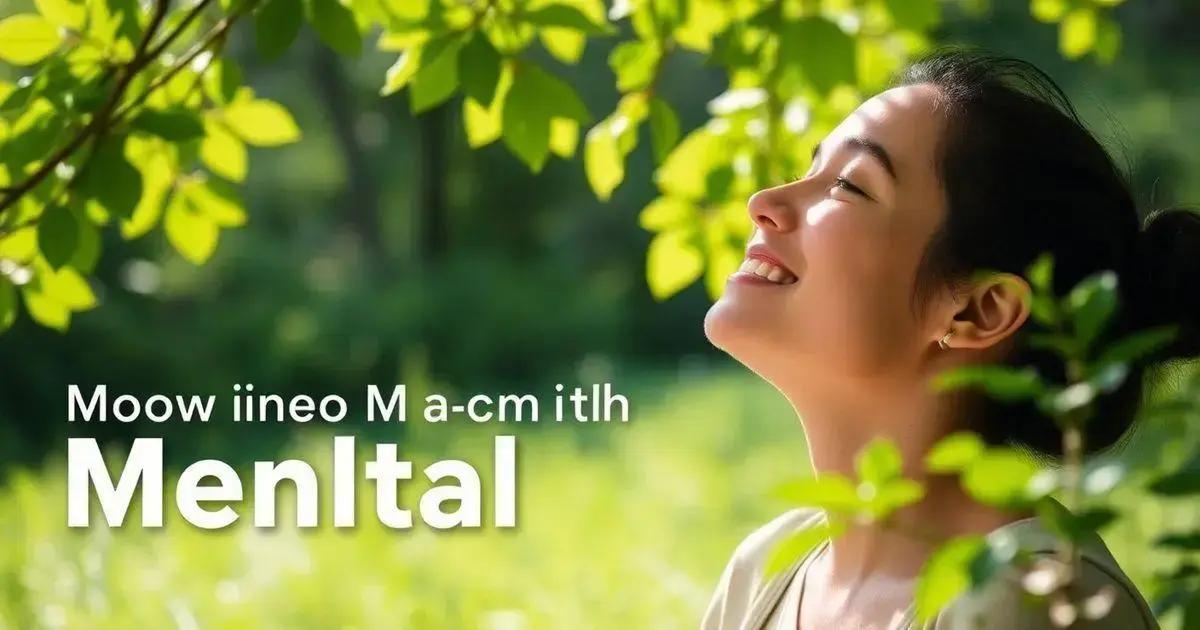Spending time in nature has significant benefits for mental health, including reduced stress, improved mood, and enhanced cognitive function. Engaging in outdoor activities like hiking, gardening, or simply walking in parks can lead to personal healing, as supported by scientific research and individual stories.
Spending time in nature has profound benefits for mental health. From reducing stress to boosting mood, nature serves as a natural remedy for many emotional challenges. In this article, we will look at the deep connection between mental health and nature, examine scientific studies that showcase these benefits, and provide practical tips to incorporate more outdoor time into your life. Join us as we delve into inspiring personal stories of healing through nature.
Understanding Mental Health and Nature Connection

Understanding the connection between mental health and nature is essential for improving our well-being. Nature therapy is becoming more recognized as a valuable method for helping individuals cope with mental health issues.
The Impact of Nature on Mental Health
Studies show that spending time in natural environments can significantly reduce feelings of anxiety, depression, and stress. Being outdoors in green spaces allows us to escape the hustle and bustle of daily life. Nature promotes relaxation, which is essential for mental health.
Biophilia: Our Innate Connection to Nature
Biophilia is the idea that humans have a natural affinity for the natural world. This attraction can create a sense of connection and appreciation for the environment. When we immerse ourselves in nature, we often feel more grounded and at peace.
Nature as a Stress Reliever
Research indicates that spending time in nature activates certain hormones that can reduce stress levels. Simply walking in a park or spending time by a body of water can elevate our mood and improve overall mental health. Regular exposure to nature encourages mindfulness, which can help in managing day-to-day stress.
Cognitive Benefits of Nature
Nature also has cognitive benefits. Studies suggest that spending time outdoors improves focus and attention. It can help reduce mental fatigue, making us feel more refreshed and ready to tackle daily tasks. This cognitive reset can be incredibly beneficial, especially in today’s fast-paced world.
Scientific Studies Supporting Nature’s Benefits

Numerous scientific studies support the health benefits of spending time in nature. One significant study published in Environmental Health Perspectives found that individuals who spend at least 120 minutes a week in natural environments reported improved health and well-being. This research highlights the importance of making time for outdoor activities.
The Role of Nature in Reducing Stress
A study conducted by Stanford University found that people who took a walk in nature versus an urban environment experienced a reduction in rumination. Rumination is the repetitive focus on distressing experiences, which can lead to depression. Nature proved effective in minimizing this mental strain.
Impact on Anxiety and Mood
Another study published in JAMA Network Open looked at the effects of greenery on mental health. Participants living in areas with more green space reported lower levels of anxiety and mood disorders. This research suggests that access to parks and nature can be vital for mental stability.
Research from University of Utah demonstrated that time spent in nature improves attention and cognitive function. The study revealed that participants who engaged in outdoor activities performed better on cognitive tasks than those who remained in urban settings. Nature helps recharge our brains, making us more alert and productive.
The Benefits of Forest Bathing
Forest bathing, or Shinrin-yoku, is a practice that originated in Japan. Studies show it can reduce cortisol levels and enhance overall mood. A review published in the International Journal of Environmental Research and Public Health found that spending time in forests can lead to substantial improvements in psychological health, supporting the practice’s benefits.
Practical Tips for Spending Time Outdoors

Spending time outdoors can be easy and fulfilling. Here are some practical tips to help you enjoy nature and boost your mental health.
1. Start with Short Walks
If you are new to spending time outside, begin with short walks. A quick 15 to 30-minute walk in a nearby park or around your neighborhood is a great start. Gradually increase your time outdoors as you become more comfortable.
2. Explore Different Settings
Vary your outdoor experiences. Try visiting parks, beaches, forests, or gardens. Each setting offers unique benefits and activities like hiking, bird watching, or simply relaxing.
3. Plan Outdoor Activities
Engage in outdoor activities you enjoy. This may include biking, jogging, or family picnics. Scheduling time for outdoor teamwork like group hikes or playing sports with friends can also keep you motivated.
4. Make Nature a Habit
Integrate nature visits into your daily routine. Consider walking during your lunch break, taking the long route home through a scenic area, or spending weekends enjoying local nature trails.
5. Connect with Local Groups
Join local outdoor clubs or groups. Hiking clubs or community gardening initiatives are great ways to meet new people and enjoy nature together. Shared experiences can enhance your appreciation for the outdoors.
6. Practice Mindfulness in Nature
While outdoors, take moments to be present. Focus on the sounds around you, the feeling of the breeze, and the sights of nature. Mindfulness practices can deepen your connection with the environment and enhance relaxation.
Personal Stories of Healing Through Nature

Many individuals have experienced personal healing through their connection with nature. These stories highlight how spending time outdoors can transform lives and improve mental health.
Emily’s Journey
Emily struggled with anxiety for years. After a particularly tough episode, she decided to take daily walks in her local park. Gradually, she noticed that being surrounded by trees and the sound of birds helped ease her anxiety. Now, Emily embraces nature as her therapy, finding peace on her walks.
John’s Discovery
John lost his job during a challenging economic period. Feeling lost, he took up hiking as a way to cope. While on a hike, he found solitude and a chance to clear his mind. He started posting about his hiking adventures online. This not only improved his mood but also led him to connect with others who share his love for nature.
Linda’s Healing Experience
After experiencing trauma, Linda turned to gardening. Planting flowers and vegetables in her backyard became a way for her to express herself. Each day spent tending to her garden brought her joy and a renewed sense of purpose. Linda credits her healing to the calm and satisfaction gardening provides.
Tom’s Community Adventure
Tom faced significant depression after a family loss. With the encouragement of friends, he joined a local outdoor adventure group. Through activities like camping and canoeing, he discovered the healing power of nature and the support of a community. Sharing these experiences with others played a crucial role in his recovery.
Maria’s Nature Retreat
Maria decided to participate in a weekend nature retreat after feeling overwhelmed. This escape into the wilderness allowed her to unplug from technology and focus on what truly matters. The meditation and hiking activities during the retreat helped her gain clarity and calm, inspiring her to spend more time outdoors.
The Importance of Nature for Mental Health
In conclusion, spending time in nature offers numerous benefits for mental health, from reducing stress to enhancing overall well-being. The strong connection between our mental health and the natural world cannot be overlooked. Whether through personal stories of healing, scientific studies, or practical tips for incorporating nature into our lives, it’s clear that nature plays a vital role in enhancing our quality of life.
As we embrace outdoor activities and experiences, we open ourselves up to a path of healing and personal growth. Remember, every moment spent in nature is an investment in your mental health and overall happiness.
So, take that first step outside, explore the wonders of nature, and discover the transformative power it holds for your mental well-being.
FAQ – Frequently Asked Questions about The Benefits of Spending Time in Nature for Mental Health
What are the mental health benefits of spending time in nature?
Spending time in nature can reduce stress, anxiety, and depression while boosting mood and cognitive function.
How can I start spending more time outdoors?
Begin with short walks in local parks, join outdoor activities, or incorporate nature into your daily routine.
What types of activities can I do in nature?
You can enjoy hiking, biking, gardening, bird watching, or simply relaxing in a peaceful outdoor setting.
Are there any scientific studies supporting nature’s benefits?
Yes, multiple studies show that spending time in natural environments improves mental health and well-being.
Can nature help with specific mental health issues?
Many individuals report improvements in mood and a reduction in anxiety and stress through consistent exposure to nature.
How can I connect with others who enjoy outdoor activities?
Join local outdoor clubs or community groups focused on hiking, gardening, or other outdoor activities.













